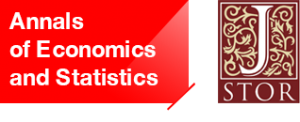Editorial Procedures and Policies of AES
This page describes current editorial procedures and policies of AES.
- AIMS AND SCOPE
The purpose of AES is to support and encourage research in all fields of economics and econometrics. Both theoretical and empirical manuscripts are welcomed. Studies that aim at the unification of the theoretical-quantitative and the empirical-quantitative approach to economic problems are welcomed.
We strongly encourage recent Ph. D. graduates to submit their work to AES. Our policy is to take into account the fact that recent graduates are less experienced in the process of writing and submitting papers.
- REVIEW PROCESS
We cannot pre-review papers. Only papers submitted as described above will be considered. Once a submission has been made the Editor will reply with an electronic message that acknowledges receipt of the manuscript. The review process begins with a manuscript number (MS#) assigned to the submission. This number should be cited in all future correspondence.
Most, but not all, papers are sent to one or more outside referees, one of whom is often an Associate Editor of the journal. These Associate Editors are leading economists who have been kind enough to agree to referee a large number of papers for us in a timely manner; we are very grateful for their help and try to use it wisely. We also try to be considerate of all of those who donate their time to referee papers for the journal. Thus, referees are instructed that we do not expect them to try to decipher poorly prepared manuscripts.
The desire to economize on scarce refereeing resources is the main reason that the Coeditor in charge will sometimes choose to reject a paper without calling on outside referees. This may happen if the paper has an obvious mistake, or is so poorly written that its correctness cannot be determined; it can also occur when the paper is both correct and clear, but seems inappropriate for this journal for various reasons. In such cases, the best policy for all concerned is that the paper be returned to the author(s) as quickly as possible.
Beyond ensuring that published papers are novel, important, and correct, the editorial staff would also like them to appear in a timely fashion. Usually, we aim to complete the review process within three to four months, although some papers may take longer.
- DECISION PROCESS
Manuscripts may be rejected, returned for specified revision, or accepted.
We expect authors who are offered the opportunity to submit a revised version of their paper to return it within one year. If a paper is returned after two years, there will be no presumption that it will be sent to the original Co-Editor (especially if he/she has left the board).
Unless the coeditor specifies otherwise, decisions are final. Unsolicited revisions of rejected papers will normally be rejected without review.
- REPLICATION POLICY
AES has the policy that all empirical, experimental and simulation results should be replicable. Therefore, authors of accepted papers are encouraged to share the submit data sets, programs, and information on empirical analysis, experiments and simulations that are needed for replication and some limited sensitivity analysis.
This material will not be made available through the AES website but the authors should keep it available if a reader requests it.
At the same time the editors understand that there may be some practical difficulties, such as in the case of proprietary datasets with limited access as well as public use data sets that require consent forms to be signed before use. In these cases detailed data description and the programs used to generate the estimation data sets could be provided, as well as information of the source of the data so that researchers who do obtain access may be able to replicate the results. We also understand that in some particularly complicated cases programs may have value in themselves and the authors may not make them public.
- “APPEALS”
What happens if you disagree with the referee reports and the Editor’s decision? The general principle (but not inflexible rule) is that our decision is final. Referees are rarely convinced by counterarguments to their reports. Sometimes the problem is one of communication; for example, the referee does not understand what the author really means. The fact, however, that such a problem exists for a supposedly expert (but sometimes unsympathetic) referee is important information. Editors on their part are rarely convinced by arguments that a referee who failed to understand the paper was incompetent or sloppy, as they have additional information contained in the referee’s cover letter and their identity (and often further correspondence with the referee).
It is important to understand that referees often make various specific comments, but that the reason for rejection is based on the more general consideration that the contribution is not sufficient. Arguing about one of the detailed comments is not fruitful; in fact, many of those comments are intended to be useful advice and not explanations for the assessment.
Rejections are very often a matter of subjective judgment regarding the importance and relevance of the contribution, and neither the editorial board not the journal can survive if these subjective assessments are open to debate. For these reasons our decisions are (almost always) final.
- CONFLICT OF INTEREST POLICY
Each author must disclose any paid or unpaid positions as officer, director, or board member of relevant non-profit organizations or profit-making entities held by him or her, or by a close relative or partner. A “relevant” organization is one whose policy positions, goals, or financial interests relate to the article.
If another party had the right to review the paper prior to its circulation, each author must disclose this fact.
